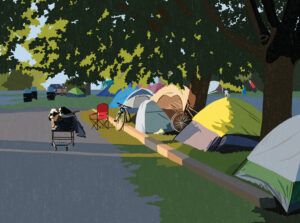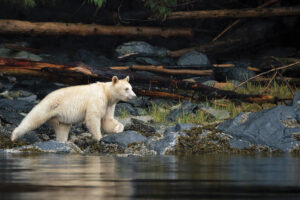
People & Culture
Kahkiihtwaam ee-pee-kiiweehtataahk: Bringing it back home again
The story of how a critically endangered Indigenous language can be saved
- 6310 words
- 26 minutes
This article is over 5 years old and may contain outdated information.
People & Culture

For 51 weeks of the year, Eddie Carvery lives alone in a battered old camper on the shore of the Bedford Basin, in Halifax. A hand-painted red sign declares the site to be the “Africville Protest.” He’s been here for 42 years, far longer than the time he lived in the community that once spread along the shoreline.
But in that 52nd week, usually in late July or early August, something extraordinary happens: Africville is resurrected. Hundreds of former residents and their descendants arrive to celebrate and reminisce, setting up tents and campers where their homes once stood before the city demolished them in the 1960s in a fit of misguided civic planning.
“The excitement is always there,” says Carvery. “Every year, it’s rekindled — that same jubilation of the community coming together. And then the sadness when everybody leaves.”
Africville was Canada’s oldest indigenous black settlement. Oral tradition dates it to the founding of Halifax, in 1749, when the new city’s small black population settled there. It grew when the Black Refugees fled the United States between 1813 and 1816 and became a thriving community with farmlands, markets and dockyards. Its population peaked in the 1960s, with about 400 people from 80 different families.
But by 1915, Halifax itself was growing, and the city needed space to accommodate its industrial infrastructure. It turned to Africville. Although residents there paid taxes (but had no running water, sewage or paved roads), the city, without consultation, began putting unwanted industries, such as slaughterhouses, in and around the area over the next few decades. In 1955, the city dump was built a few hundred metres from Africville’s church.
Are you passionate about Canadian geography?
You can support Canadian Geographic in 3 ways:

People & Culture
The story of how a critically endangered Indigenous language can be saved

People & Culture
For unhoused residents and those who help them, the pandemic was another wave in a rising tide of challenges

Wildlife
How ‘maas ol, the spirit bear, connects us to the last glacial maximum of the Pacific Northwest

Places
In Banff National Park, Alberta, as in protected areas across the country, managers find it difficult to balance the desire of people to experience wilderness with an imperative to conserve it